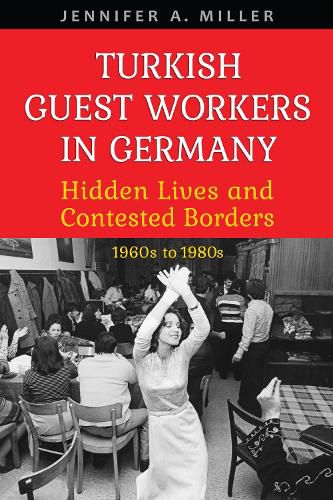Readings Newsletter
Become a Readings Member to make your shopping experience even easier.
Sign in or sign up for free!
You’re not far away from qualifying for FREE standard shipping within Australia
You’ve qualified for FREE standard shipping within Australia
The cart is loading…






Turkish Guest Workers in Germany tells the post-war story of Turkish guest workers, whom West German employers recruited to fill their depleted ranks. Jennifer A. Miller’s unique approach starts in the country of departure rather than the country of arrival and is heavily informed by Turkish-language sources and perspectives.
Miller argues that the guest worker program, far from creating a parallel society, involved constant interaction between foreign nationals and Germans. These categories were as fluid as the Cold War borders they crossed. Miller’s extensive use of archival research in Germany, Turkey and the Netherlands examines the recruitment of workers, their travel, initial housing and work engagements, social lives, and involvement in labour and religious movements. She reveals how contrary to popular misconceptions, the West German government attempted to maintain a humane, foreign labour system and the workers themselves made crucial, often defiant, decisions. Turkish Guest Workers in Germany identifies the Turkish guest worker program as a postwar phenomenon that has much to tell us about the development of Muslim minorities in Europe and Turkey’s ever-evolving relationship with the European Union.
$9.00 standard shipping within Australia
FREE standard shipping within Australia for orders over $100.00
Express & International shipping calculated at checkout
Turkish Guest Workers in Germany tells the post-war story of Turkish guest workers, whom West German employers recruited to fill their depleted ranks. Jennifer A. Miller’s unique approach starts in the country of departure rather than the country of arrival and is heavily informed by Turkish-language sources and perspectives.
Miller argues that the guest worker program, far from creating a parallel society, involved constant interaction between foreign nationals and Germans. These categories were as fluid as the Cold War borders they crossed. Miller’s extensive use of archival research in Germany, Turkey and the Netherlands examines the recruitment of workers, their travel, initial housing and work engagements, social lives, and involvement in labour and religious movements. She reveals how contrary to popular misconceptions, the West German government attempted to maintain a humane, foreign labour system and the workers themselves made crucial, often defiant, decisions. Turkish Guest Workers in Germany identifies the Turkish guest worker program as a postwar phenomenon that has much to tell us about the development of Muslim minorities in Europe and Turkey’s ever-evolving relationship with the European Union.